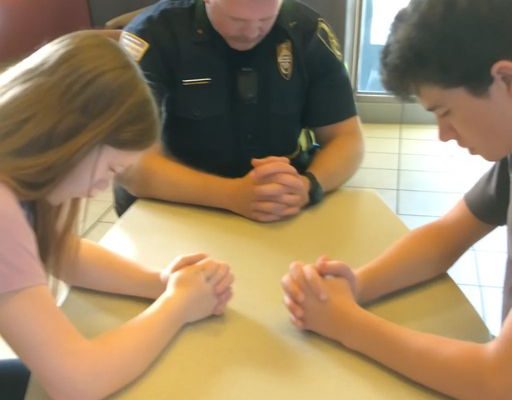I finally reached for the envelope and slid it closer, but before I could unfold it, Officer Rollins looked me straight in the eye and said:
“This isn’t from me. It’s from someone who asked me to find you.”
That stopped me cold.
I hadn’t told him my last name. I hadn’t even mentioned where I was from. The only thing he knew was our first names, and that Milo had named the puppy “Hope.”
I asked him what he meant, but he just nodded toward the two teenagers sitting across from him now—heads bowed again in prayer, just like they had the day before.
“They’re part of a group that does these… quiet acts,” he said. “No publicity, no strings. But they’ve been looking out for families like yours. Someone passed your story along.”
I wanted to believe it. I really did.
But part of me still couldn’t trust it. It felt too… orchestrated. Too targeted.
I opened the envelope, expecting maybe a gift card or a note of encouragement.
Instead, it was a key.
And a street address scribbled on a sticky note.
No explanation. Just one sentence underneath:
“You don’t have to sleep on concrete tonight.”
I looked up at Rollins.
And that’s when he told me who the address belonged to.
“It belongs to a woman named Cora Whitman,” Officer Rollins said slowly, as if gauging how much weight each word carried. “She passed away six months ago. Her family decided not to sell her house right away—they’re renting it out temporarily through this network.”
“A network?” I echoed, frowning. “What kind of network?”
Rollins shrugged slightly, his expression unreadable. “It’s hard to explain. They call themselves ‘The Quiet Ones.’ People who want to help without fanfare. No red tape, no bureaucracy. Just… people helping people.”
My mind raced. We’d been living out of our car for nearly three months after losing the apartment. Between medical bills from Milo’s asthma treatments and my hours being cut at work, we were drowning. Every night, we parked behind an abandoned gas station because it felt safer than most places. Hope, our scrappy little rescue pup, curled up between us in the backseat, keeping us warm—or at least distracted from the cold.
But now, here was a stranger offering us shelter. A dead stranger. And somehow, her generosity had found its way into my hands.
“Why us?” I whispered. “How did anyone even know about us?”
Officer Rollins didn’t answer directly. Instead, he gestured toward the teens still praying quietly nearby. One of them—a girl with curly brown hair tucked under a baseball cap—glanced over and gave me a small smile.
“They hear things,” he said simply. “People talk. Word spreads. Sometimes all it takes is one person noticing.”
By the time we pulled up to the address—an unassuming blue-and-white bungalow tucked between two larger homes—it was late afternoon. The sun hung low in the sky, casting long shadows across the neatly trimmed lawn. A handmade sign by the mailbox read: Welcome Home.
Milo unbuckled his seatbelt and leaned forward, pressing his nose against the window. “Is this real, Mom? Are we really staying here?”
“I guess we’ll see,” I murmured, though my heart was pounding so hard I thought it might burst. This felt surreal. Too good to be true. What if it turned out to be some elaborate scam? Or worse, what if there was a catch I wasn’t seeing?
We climbed out of the car, Hope bounding ahead of us, tail wagging furiously. As I unlocked the front door, I braced myself for… something. Anything. But when I pushed it open, the sight inside made me freeze.
The living room was cozy and inviting, with soft throw blankets draped over the couch and fresh flowers arranged on the coffee table. A basket near the doorway held toys and dog treats labeled “For Hope.” In the kitchen, the fridge was stocked with groceries, including Milo’s favorite cereal. On the counter sat a handwritten note:
“Make yourself at home. Everything here is yours until you’re ready to move on. – C.W.”
Tears welled in my eyes as I turned to Milo, who stood wide-eyed in the doorway, clutching his backpack like it might disappear at any moment.
“Can we stay?” he asked softly.
I nodded, unable to speak past the lump in my throat. “Yeah, buddy. We can stay.”
Over the next few weeks, life began to feel almost normal again. Milo started attending the local elementary school, where teachers went out of their way to make him feel welcome. Hope explored every inch of the backyard, chasing squirrels and digging holes with reckless abandon. And me? I got a part-time job at a café downtown, thanks to a recommendation from—you guessed it—one of those mysterious “Quiet Ones.”
Still, questions lingered. Who exactly was Cora Whitman? Why had she left her house to strangers? And why did this whole situation feel like more than just random kindness?
One evening, while Milo was asleep and Hope snored softly at my feet, I decided to do some digging online. After searching for nearly an hour, I stumbled upon an obituary for Cora. She’d been a retired teacher, beloved by students and colleagues alike. According to the article, she’d spent decades volunteering at shelters and mentoring kids in underserved communities.
But what caught my attention most was a quote from one of her former students: “Cora always said, ‘When you see someone struggling, don’t wait for someone else to step in. Do something yourself.’”
Something clicked then. Maybe this wasn’t just about charity. Maybe it was about paying it forward. About creating ripples of goodness that kept spreading outward.
Then came the twist I never saw coming.
A month later, I received another envelope in the mail. Inside was a letter addressed to me, written in neat cursive handwriting. It began:
Dear Stranger,
If you’re reading this, it means you’ve found your way to my home—and hopefully, it’s brought you some peace. Before I passed, I set aside funds to ensure this house would remain available for families like yours. Families facing storms they didn’t ask for but are brave enough to weather anyway.
I also included something special for you—a journal. Write down your story. Share your struggles, your victories, your hopes. Because someday, someone else will walk through that door carrying their own burdens. And maybe, just maybe, your words will remind them that they’re not alone.
At the bottom of the page, there was one final instruction:
When you’re ready, leave the journal behind for the next family. Let it become a chain of connection, a reminder that kindness echoes far beyond what we can see.
That night, I sat at the kitchen table with the journal open in front of me. For the first time in months, maybe years, I allowed myself to truly reflect on everything we’d been through. The fear, the uncertainty, the moments of grace amid chaos. As I wrote, tears streamed down my face—but they weren’t tears of sadness. They were tears of gratitude.
By the time I finished, dawn was breaking outside. I placed the journal carefully on the shelf above the fireplace, knowing it would wait patiently for whoever needed it next.
Years later, when Milo graduated high school and we finally moved on to a place of our own, I left a note of my own tucked inside the journal. It read:
To Whoever Finds This:
You don’t have to face the world alone. There are people out there rooting for you—even if you can’t see them. Be brave. Be kind. And remember: hope has a way of finding us when we least expect it.
As I drove away from the little blue-and-white bungalow, I realized something profound. Cora’s gift hadn’t just given us a roof over our heads. It had taught us the power of compassion, resilience, and community. It reminded me that even in the darkest times, light exists—if we’re willing to look for it.
So, dear reader, if this story resonates with you, share it. Pass it along. You never know whose life might change because of it. And if you’ve ever benefited from an act of kindness—big or small—take a moment to pay it forward. The world needs more people like Cora Whitman. More people like you.
Like and share this post to spread the message of hope. Together, let’s keep the chain going.



